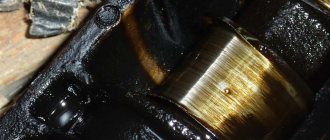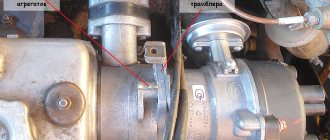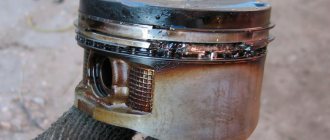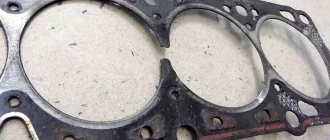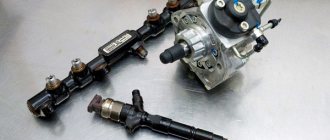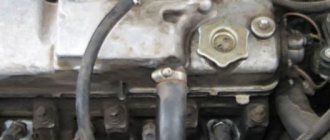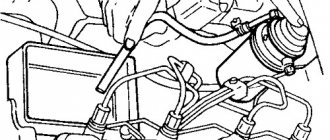Cause of engine detonation after turning off the ignition
Spontaneous outbreaks of a combustible mixture in combustion chambers
The process we call detonation is the uncontrolled active combustion of fuel both while the engine is running and after it is stopped.
If in normal mode the air-fuel mixture can burn and propagate the flame front at a speed of 25 to 30 m/s , then during the detonation process the front propagates at a speed 10–15 times faster. And this looks more like a destructive explosion. However, detonation is often confused with glow ignition.
Cause of engine detonation after turning off the ignition
Glow ignition occurs as a result of overheating of combustion chamber parts , mainly coke and carbon deposits on the piston bottom, spark plugs and the chamber itself. The process occurs as follows: we turn off the ignition, but the crankshaft, by inertia, continues to move the piston down, sucking in the fuel-air mixture. It ignites not from the sparking of a candle, but from the temperature of overheated parts. Thus, the combustion process can continue for several more seconds, sometimes up to 10–12 .
Glow ignition, or is it detonation?
The causes of glow ignition can be:
- In carburetor engines, the fuel supply must be shut off immediately after the ignition is turned off using a forced idle economizer. This may be the reason for the abnormal supply of the fuel-air mixture due to the valve stem jamming. This happens because the rod may wear out or become coked. As a rule, the problem is eliminated by cleaning the forced idle economizer valve and replacing it.
- In engines with an injector, the entire power system is controlled electronically, so the reason must be sought first of all in the malfunction of the idle speed sensors and the electronic engine control unit.
- In diesel engines, the cause of hot ignition may be a malfunction of the injectors, the high-pressure fuel pump, which also supplies diesel fuel to the combustion chamber. In diesel engines, this can often occur due to a change in the compression ratio as a result of significant carbon deposits, and in this case, indeed, it is worth talking about detonation rather than glow ignition.
What is engine detonation?
Detonation is a process in which combustion of the mixture occurs at a speed of about 2000 m/s, when in normal mode the fuel in the cylinders should ignite at a speed of 30 m/s. Detonation is always accompanied by the release of heat in very large quantities, which is characterized by an enormous speed of propagation of the shock wave.
The detonation process is dangerous because with a large release of heat, the oil layer is disrupted. The fact is that when oil is removed from the surface of the metal, its increased expansion occurs, which is characterized by its deformation. Thus, the cylinder head can be easily damaged.
Another danger of detonation is associated with damage to the cylinder head gasket and the appearance of an oxide layer on the piston group, which also negatively affects the operation of the entire engine as a whole. The problem also affects valves, which can either become covered with soot or easily crumble.
Determining the detonation process is quite simple: at this moment you can hear a rather loud metallic knock from the engine, which appears when the pressure inside the cylinders is increased.
Detonation as it is
Detonation as it is
Detonation can occur for several reasons with similar symptoms, but the consequences can be much worse. During detonation, a huge amount of heat is released uncontrollably, catalyzing the combustion process of the fuel-air mixture.
Main causes of detonation
With similar symptoms, the causes of detonation may be:
- Using fuel with a low octane rating and lower knock resistance than recommended by the engine manufacturer. In this case, detonation occurs due to a mismatch between the compression ratio and the type of gasoline or diesel fuel - they spontaneously ignite without sparking, due to the high compression ratio and high temperature in the combustion chamber. To avoid detonation processes, it is enough to fill the car with gasoline with exactly the same octane number as indicated by the manufacturer.
- In addition, the quality of the fuel , the presence of impurities, water, and solid fractions in it are also important. Ignition too early can also cause detonation due to a violation of the temperature regime in the combustion chamber. In this case, the working mixture also burns uncontrollably, since the parts of the cylinder-piston group are overheated. The glow number of the spark plugs does not correspond to the manufacturer’s recommendations. In principle, there are no wrong spark plugs, they simply may not correspond to the operating modes of a particular engine, become hot and also cause detonation, the fuel will burn without sparking.
- Carbon deposits in the combustion chamber , on the piston bottom, and on the valves lead to a decrease in the volume of the combustion chamber, and this, in turn, increases the compression ratio. In this case, even with good gasoline that matches the engine, detonation may occur. Motorists cite several reasons for the formation of carbon deposits, including operating the engine under low load conditions. To prevent the occurrence of carbon deposits, it is advisable to let the engine periodically run under heavy load, at high speeds.
- Engine overheating . If we are confident in the quality of the fuel, in the condition of the cylinder-piston group and in the correctly set ignition timing, it is worth paying attention to the cooling system: the level of antifreeze, the correct operation of the thermostat, as well as the quality of the coolant, the cleanliness of the cooling radiator, the operation of the electric radiator cooling fan .
Detonation can cause engine damage
Any of the listed reasons, and even more so, their complex, can cause detonation after the ignition is turned off, which can lead to complete destruction of the engine.
Symptoms of malfunction and performance check
The design of the knock sensors is almost the same; they are also identical in principle of operation. As mechanical stress increases, energy production increases. If the sensor operates normally, small electrical impulses are generated that are not passed by the resistor installed in the sensor design.
The cost of this element is usually low. The price differs depending on the quality of the sensor and the manufacturer. On average, it costs between 250 and 500 rubles.
Sensor malfunctions are quite capable of affecting the performance of the entire engine. If the sensor is faulty, the control unit immediately switches the engine to emergency mode. In order to identify a malfunction in time, you need to know the main signs of a breakdown:
- unstable engine operation when driving;
- reduction in power unit power indicators;
- increased fuel consumption;
- Difficulty starting the engine.
Signs of a faulty knock sensor on a VAZ-2107 are similar to all VAZ cars. Therefore, before replacing, it is necessary to check its performance.
To check and subsequently replace this element, you need to know exactly where the sensor is located, and also learn how to determine its serviceability.
In the VAZ-2107, the knock sensor is located near the exhaust manifold, structurally designed as a massive washer that is attached to the car engine with a bolt.
The knock sensor can be checked in two ways:
- technical
- mechanical.
| Verification method | Actions Performed |
| Technical | Measuring the sensor resistance with a device. If it is working properly, the indicator should be no more than 2 kOhm. |
| Mechanical | It is more efficient. To do this, you need to start the engine, then you need to take a small hammer and lightly tap the sensor. If the sensor is fully operational, a decrease in engine speed should be observed, since the control unit will interpret these actions as detonation. |
Replacing the sensor yourself is quite easy. You need to use a wrench to unscrew the bolt that secures the sensor to the engine, first disconnecting the wiring. After this, a new sensor should be installed in place of the old one.
As a result, it should be said that in order to prevent such a phenomenon as detonation in a VAZ-2107 car, you should periodically check the performance of the knock sensor (like all other sensors) and, in case of failure, immediately replace it with a new one. This way you can protect yourself from unnecessary financial costs.
Engine detonation when the ignition is turned off and after
First, it’s worth understanding what the detonation process is, what signs it is characterized by, and whether there is a normal detonation mode, and if so, within what limits? This process is extremely undesirable, especially during engine operation, since it represents accelerated and uncontrolled combustion of the combustible mixture, which leads to sudden shocks and, accordingly, additional loads on the cylinder-piston group, as well as the crank mechanism.
The engine knocks after turning off the ignition - reasons
Most often, engine detonation when the ignition is turned off occurs due to unsuitable fuel: its octane number is lower than that provided for by the technical requirements of the creators of a particular engine. The thing is that low-octane fuel is used for engines with a lower compression ratio. Thus, if the type of gasoline does not match the type of engine (for example, it is necessary to use A-95, but instead A-76 is poured), then its active combustion occurs (almost at the speed of an explosion).
During active combustion, quite a lot of thermal energy is released, which as a result does not have the best effect on the operation of the entire system and on the condition of the engine.
Another reason why the engine knocks when the ignition is turned off may be too early ignition. Most often, it is installed so that the engine is more sensitive to the opening of the throttle valve, but in this case the air-fuel mixture ignites earlier during the upward movement of the piston, which leads to excessive overheating. This process can also be triggered by engine overheating and installation of inappropriate spark plugs.
Purpose of the VAZ 2110-2112 knock sensor and its operating principle
In modern “tens” with an injector, a VAZ 2110 knock sensor is needed to control the electronic logic of the setting moment for igniting the fuel mixture with spark plugs. Late ignition causes large excess fuel consumption, reduced power and overheating of the internal combustion engine. Too early causes valve burnout, micro-explosions (detonation) and a drop in power.
Thus, if you have a corresponding indicator on in your cabin, indicating that the VAZ 2110 knock sensor is faulty (Check Engine), you should immediately take care of its repair. In this case, the electronics switches the engine control system to a safe mode, which is not optimal in terms of internal combustion engine power and fuel consumption.
The operating principle of any DD on the VAZ 2112, 2111 and 2110 is based on the piezoelectric effect, when the level of generated voltage directly depends on the degree of physical impact on the piezoelectric element. The greater the shake, force, pressure or pressing, the greater the voltage pulse generated.
On VAZ 2110-2112 cars, two possible types of knock sensor can be installed:
- broadband;
- resonant type.
In the first case, the ADC converter of the control controller perceives the entire range of analog current signals generated by the sensor. In the case of using the phenomenon of resonance, the measuring unit perceives only vibrations of a certain frequency, characteristic of the moment of detonation inside the internal combustion engine.
Wideband and resonant VAZ knock sensors are not interchangeable, since they differ in signal levels. Therefore, if the question arises about which sensor to use specifically in your case, always start from what exactly was installed under your hood all this time.
When the ignition is turned off, the engine detonates - how to save the car?
Of course, if the engine is running with the ignition off, which is the best indication of detonation, the first thing you should pay attention to is the fuel used. It goes without saying that you can only use fuel that fully complies with all the requirements of the manufacturer. In addition, refuel at reliable gas stations, since small savings (a few rubles per liter) can result in hefty expenses for repairing the “heart” of the car.
You should also check the ignition angle, and if it is too early, this can lead to damage to the friction pairs, and as a result, scuffs and other defects form on the liners and the crankshaft. In this case, the ignition angle should be adjusted so that it is within normal limits. Questions may also arise regarding spark plugs. Please note that spark plugs are strictly recommended by car manufacturers, and you should not deviate from these recommendations, otherwise in the fairly near future you will have to tinker a lot with your car to fix the problems that have arisen.
If the quality of the fuel is not in doubt, and the spark plugs are in order, and ignition occurs on time, then it is quite possible that the cause is overheating. Quite often you can encounter a situation where the engine jerks after turning off the ignition. Be sure to check the coolant level and assess the condition of the thermostat. If there is something wrong with it, then immediately contact the service center.
Can a car engine detonate when turned off: let’s understand the aspects
It is wrong to classify uneven engine operation or any other knocking as a sign of detonation. To avoid mistakes, the best option would be to find out what the detonation mode sounds like in practice. For example, watch thematic video files.
Dieseling
As already noted, an undesirable phenomenon can appear exclusively on a functioning motor. How then to qualify the operation of the power plant with the ignition off? The mechanics' answer is short - dieseling. Its nature is different: self-ignition of gasoline, identical to the working process of a diesel engine.
Beginners who have caught up on their knowledge base on gasoline internal combustion engines will immediately object, citing a couple of arguments “against”: high-octane fuel has poor self-ignition ability, and the compression ratio in a gasoline engine is lower. All this is true, but when the unit is stopped, favorable conditions are created for dieseling.
